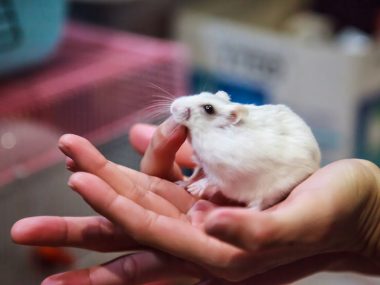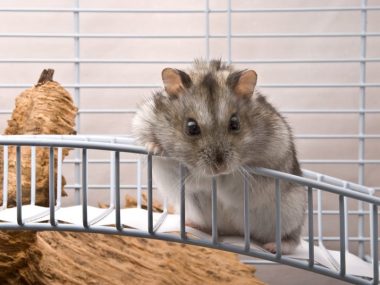It’s always difficult to deal with a pet dying as they become part of your family. Yet, you often can’t do anything to stop it from happening. If your hamster has suddenly passed away, you might wonder why hamsters die so fast.
Let’s face it, a hamster lifespan is already short. Some hamsters eventually die even faster when symptoms go unnoticed, so you don’t know they’re sick until it’s too late. They’re fragile creatures susceptible to various illnesses and conditions that can kill them quickly, even when they seem otherwise healthy.
In this article, you’ll get all the information you need so you are never caught off guard by the sudden death of your pet hamster.
Table of Contents
What Is the Normal Hamster Lifespan?
Hamsters typically live between 2 and 3 years. However, different breeds of hamsters can all have varying average lifespans with some going up to 3 and a half years.
Here’s a handy table you can use to help remember the average lifespan of the most common hamster breeds.
| Breed | Lifespan (in years) |
|---|---|
| Syrian | 1 ½-3 years |
| Roborovski dwarfs | 1 ½-3 ½ years |
| Winter White | 1-2 years |
| Campbell | 1-3 years |
| Djungarian | 1-2 years |
| Chinese | 1-3 years |
When determining if a hamster is right for you, the question “how long do hamsters live?” might pop into your mind.
Well, in most cases, humans will outlive their hamster pets.
If you would prefer to spend more years with your furry friend, on average, hamsters might not be the companion for you.
Do Hamsters Die Easily?
A look at the average hamster lifespan might make you wonder if these little creatures are hard to keep alive.
But that’s not necessarily the case. While these animals are pretty tiny prey animals, they’re easily spooked, making them fragile.
However, that doesn’t make it difficult to keep them healthy as long as they are alive.
Hamsters don’t die easily. In fact, if you manage to keep your hamster’s life relatively stress-free and healthy, they shouldn’t be prone to dying any earlier than they would in any other situation.
What Is the Most Common Cause of Death in Hamsters?
As already mentioned, hamsters can be fragile animals.
The most common cause of hamster death is stress as they are particularly bad at handling it. Since they’re prey animals, they might react with more adrenaline than necessary to a situation that startles them, which could lead to certain conditions and eventually to death.
Aside from stress, however, there are multiple other common causes of death for domestic hamsters.
A few of the most common causes of sudden hamster death other than stress include:
- Age: Since hamsters don’t usually live longer than a few years, once they become elderly, they are most likely to die.
- Diarrhea: This is typically caused by stress. However, other things like food intolerance can also cause this condition. If untreated, it can lead to death.
- Pneumonia: Since hamsters are usually kept in a delicately maintained environment, if something changes, such as the temperature, it can promote bacterial growth, leading to death.
Can I Prevent My Hamster From Dying?
In some cases, there’s nothing you can do to stop your hamster from dying.
If you fail to notice that your hamster is sick until their condition progresses too far, your only solution might be to ensure the hamster stays comfortable during the remaining period.

Additionally, there’s not much you can do to prevent your hamster from dying of old age since you cannot extend their life once they reach an elderly age. The same can be said for any genetic conditions your hamster might have been born with that could lead to death.
Keeping your pet relaxed can greatly help reduce its risks of dying prematurely. Stress can trigger numerous other conditions, while stress itself can also cause death.
Still, there are some things you can do to help prevent your hamster from developing a potentially deadly condition, helping it live a full life:
- Ensure to follow regular hamster care protocol.
- Try to keep your hamster as relaxed as possible.
- Take note of what seems to scare your hamster, and avoid subjecting your pet to the same – If you notice your hamster seems stressed after you pick it up, refrain from doing so.
- Keep an eye on your hamster’s behavior to see if it changes. For instance, hamsters are super clean animals so if you notice yours has stopped grooming itself, that’s a sign it might be unwell.
- Check whether your hamster has any particular reactions to any food or bedding to ensure you’re feeding it properly, and the bedding isn’t causing any irritation.
- Keep your hamster in a stable habitat – make sure it’s in a well-ventilated place that isn’t too hot or cold and the temperature and humidity stay relatively consistent.
It’s essential to note that sudden environmental changes, even slight ones, can cause your hamster stress thus affecting its health.
What To Do With a Dead Hamster?
Unfortunately, sometimes you can’t save your hamster.
Whether your pet died of old age or something else, you have to take care of it once it has passed on.
The options available to you might vary. However, you’ll have to decide between a few possibilities.
If you have a dead hamster, you can call in a vet to help you dispose of the body properly. Your other options are cremating the hamster or burying it.
- Call a vet. If you want to know the cause of your hamster death, call your vet and ask if they would be willing to do an autopsy. After that, it’s likely your vet will take care of disposing of your pet if you want them to.
- Cremate your hamster. There are cremation services available and the service providers can cremate your pet for you if you wish to keep the ashes in their memory.
- Go for pet burial. There are also pet burial options available. Whether you decide to bury your hamster in the backyard or have a pet cemetery made available to you, this is also a viable option.
Final Thoughts
There are many reasons why hamsters die so fast. In many cases, a hamster might have been sick for a while but could have been hiding its symptoms. However, stress and old age are the two leading causes of hamster death.






